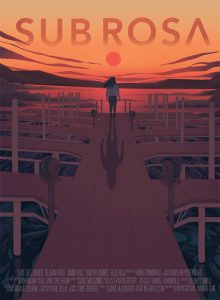Sub Rosa, an independent film made by MSU students during the spring of 2018, has received recognition from three film festivals.
The short is an official selection in the Human Trafficking Awareness Film Festival, the Catharsis International Film Festival and the First City Film Festival.
Assistant professor Jocelyn B. Millana worked as the faculty advisor to the students making Sub Rosa.

The film follows a group of students staying at a cabin on a lake. When one of the students is murdered, his friends try to figure out what happened.
Sub Rosa was one of two films approved for production last semester, out of a competitive group of short film pitches.
Millana gave the students strict deadlines to meet, which helped prepare them for the real world of filmmaking.
Millana says, “I made them sign contracts. I tried to train them to commit and not make the excuse that they were simply students.”
The students had to interview with Millana personally to determine whether or not they would receive credit hours for their work on the film. The students then had to meet with Millana three times during pre-production, production and post-production to confirm their work was on schedule.
Millana says, “I’m very proud of how the students executed this project. Some of the advanced students, like the director of photography, some of the student producers, and the director were former students of mine. It showcases that they know how to execute a film and how to involve the community.”
Another requirement of Millana’s was that the students fundraise for their film by asking local businesses for donations.

Millana elaborates, “I teach in my advanced producing class that in pre-production, you need to fundraise and seek out sponsors for your film. I was very happy to hear that the students secured volunteers from the police department to be in the film, free cabins on Lake Pomme de Terre for filming and food sponsors.”
Millana encouraged the students to make diversity and inclusion their goals as well.
She explained, “For example, the police officer in the original script was a man and I suggested to the students that they make the character a woman.”
Millana was adamant that she was simply a guide for Sub Rosa.
Says Millana, “The students came to me and asked if they could credit me as an executive producer on the film and I told them no, that I was their advisor, and there’s a difference there. I want them to take full credit for their work. It’s not my film.”
In response to the film program’s continued growth and evolutions, the independent filmmaking initiative is evolving. Going forward, student filmmakers will take independent studies as summer course work and will be required to recruit a total of at least ten students to work on the crew for the project.

